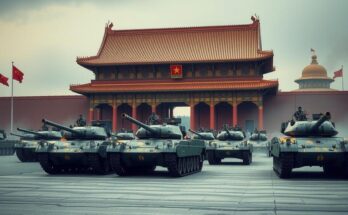Sudan is facing the world’s worst humanitarian crisis as millions are at risk of famine due to ongoing conflict and inadequate aid access. With over 24 million experiencing acute hunger, immediate action is essential. The conflict has displaced more than 11 million people within Sudan, and obstructions to humanitarian access exacerbate the crisis. The international community must take urgent steps to alleviate the suffering of the Sudanese people.
The ongoing crisis in Sudan has escalated into the world’s most severe humanitarian disaster, with increasing calls for urgent international intervention. Jan Egeland, Secretary General of the Norwegian Refugee Council, emphasized the grim reality facing millions as famine looms, stating, “We must wake up the world before famine engulfs a generation of children.” The conflict has resulted in staggering loss of life, with over 2,500 deaths in one month and 250,000 newly displaced individuals.
Sudan is currently in the midst of the largest displacement crisis globally, affecting over 11 million people internally and forcing three million to seek refuge in neighboring nations like Chad and Egypt. Egeland highlighted that approximately one in every five Sudanese individuals is displaced, causing overcrowded living conditions in the few remaining safe areas, with families surviving on limited resources.
The widespread hunger in Sudan is a pressing issue, with an estimated 24 million people—half the population—facing acute food shortages. Egeland described starvation as a man-made tragedy, noting starvation now prevalent in locations such as Khartoum. He remarked, “The ongoing starvation here is a man-made tragedy,” drawing attention to the difficulty of many, including women who can only find sustenance in the form of boiled leaves.
Despite the urgent need for aid, obstruction from warring factions continues to hinder humanitarian access. Egeland condemned the use of hunger as a weapon, stating, “Each delay, every blocked truck… is a death sentence for families who can’t wait another day.” This underscores the moral implications of the ongoing conflict, as immediate aid remains critically necessary for survival.
Currently, the humanitarian response in Sudan is severely underfunded, resulting in harsh decisions regarding resource allocation. Egeland warned that many life-saving initiatives, including soup kitchens in Khartoum, have been forced to close. He argued that the humanitarian efforts are merely postponing deaths instead of preventing them, further complicating the already dire situation.
Sudan is engulfed in an extensive humanitarian crisis exacerbated by armed conflict and political instability. The civil strife has displaced millions and created acute food shortages, deepening the suffering of many civilians. International attention was once focused on Sudan’s atrocities, particularly in Darfur, but the ongoing crises now involve even more lives at risk while global responses have waned, prompting dire warnings from humanitarian organizations. The Norwegian Refugee Council is actively engaged in providing support but faces significant operational challenges due to funding shortages and impediments to aid access.
The situation in Sudan exemplifies a tragic humanitarian crisis demanding immediate attention and action from the international community. Millions are at the brink of starvation, and without decisive intervention, the suffering will only escalate. It is imperative for global leaders to recognize the urgency and respond with the necessary aid and support to prevent further loss of life and suffering among the Sudanese population.
Original Source: www.nrc.no




